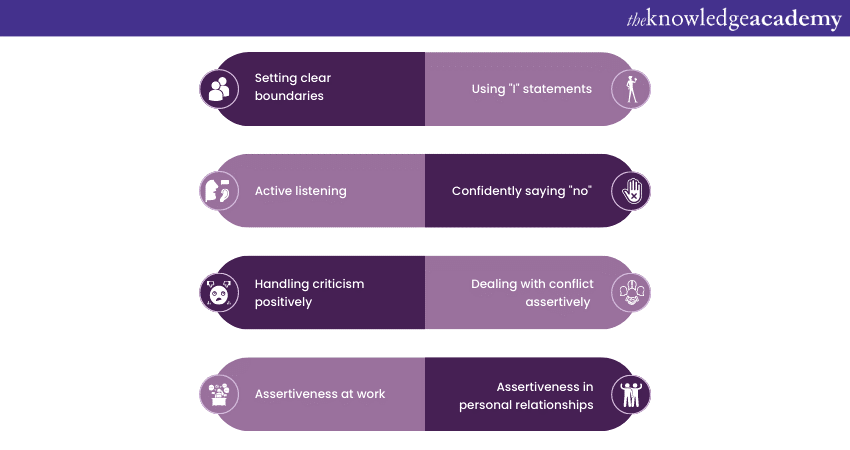We may not have the course you’re looking for. If you enquire or give us a call on 0800 446148 and speak to our training experts, we may still be able to help with your training requirements.
Training Outcomes Within Your Budget!
We ensure quality, budget-alignment, and timely delivery by our expert instructors.

In today's interconnected and fast-paced world, effective communication has become more vital than ever before. Among the various communication styles, Assertive Behaviour stands out as a powerful tool for building healthy relationships.
Assertive behaviour means confident, respectful communication while respecting others and assessing one's assertiveness in various situations. It fosters mutual respect and achieving personal growth. Not only that an Assertive person can facilitate smooth communication and solve problems efficiently. Want to know how?
Check out this blog to learn what Assertive Behaviour is. Also, explore various traits of assertiveness and how can the help make decisions.
Table of Contents
1) What is Assertive Behaviour?
2) What are the benefits of being Assertive?
3) Exploring the risks of being Assertive?
4) Different Assertive Behaviours and their aspects
5) Conclusion
What is Assertive Behaviour?
Assertive Behaviour is characterised by the confident expression of one's thoughts, feelings, and needs while respecting the rights and boundaries of others. It involves advocating for oneself directly, honestly, and respectfully without being passive or aggressive. Assertive individuals are able to voice their opinions and stand up for their rights without disregarding or demeaning others. Core characteristics of Assertive Behaviour include the following:
a) Clear and concise communication
b) The ability to express emotions constructively
c) The capacity to set and maintain personal boundaries
Assertiveness differs from passive and aggressive behaviours in several keyways. Passive individuals tend to avoid conflict and may suppress their needs and opinions. This often leads to unexpressed frustration and resentment. Aggressive individuals, on the other hand, dominate conversations and impose their views on others, often at the expense of their relationships.
The importance of being Assertive lies in its ability to promote open and honest communication, leading to healthier and more authentic interactions. By assertively expressing oneself, individuals can avoid misunderstandings, reduce conflicts, and build stronger connections. Assertiveness also fosters mutual respect and trust. This creates a positive environment for constructive discussions and problem-solving.
What are the benefits of being Assertive?
Showcasing an Assertive Behaviour allows an individual to communicate their wants and necessities in a more authoritative tone, while maintaining fairness and empathy at the same time. It can significantly help them become more self-confident and especially improve their overall mental well-being.
Additionally, Assertiveness provides individuals many other benefits which can help them in their workplace and in other aspects of their life. Here is a list highlighting the characteristics of Assertive people:
a) They make excellent Managers: Assertive individuals successfully manage to get tasks accomplished by treating people with respect, kindness and fairness. They in turn get treated with appreciation and respect and are well-liked by their team and are perceived as leaders that people desire to work with.
b) Ability to negotiate ‘win-win’ solutions: Assertive individuals are capable of recognising the value of their opponent’s stance and can immediately find mutual ground with them.
c) Better doers and great problem-solvers: Individuals with an Assertive personality are empowered to come up with the optimal solution to the issues they face .
d) More relaxed and calm: Individuals armed with an Assertive personality know how to reassure themselves and generally keep a control over their minds and situations. They do not put themselves into a victim’s position or feel threatened if and when events do not go as they planned.
e) Better job satisfaction: Assertive individuals possess more confidence than their co-workers or counterparts. It is because they possess the ability to make fruitful decisions by maintaining boundaries with others. This confidence is connected with their sense of self-worth and overall esteem. Their confidence also entails that they are able to say ‘no’ if necessary to a certain task. Such individuals are adept at maintaining their boundaries where needed.
Exploring the risks of being Assertive
Few organisational environments and certain nations prefer if their employees or subordinates remain passive. Such cultures may even perceive Assertive Behaviour as offensive or rude. Gender can also heavily influence the perception of Assertive Behaviour, where men are much more likely to be appreciated and rewarded for their Assertive nature than women.
This situation, however, does not entail that individuals need to succumb and surrender to the status quo and behave as required just for the sake of approval from their superiors and co workers. They could much rather try being more bold and observe their pain points and experiment with their personality accordingly.
Now, such scenarios also come with a risk if the individual tries to go to an extreme with their behaviour. For example, if the individual tries to be Assertive over the acceptable threshold, they may unknowingly or unintentionally stop paying an attentive ear to others despite their good ideas.
Such behavioural changes can result in them alienating their co-workers and strain their professional bridges. They can prevent this by experimenting with tiny steps, as they discover what works for them in the workplace. It is important to note that even a small amount of Assertion can go a long way for individuals, if utilised at the right time.
Different Assertive Behaviours and their aspects
Assertive Behaviour comes in various forms, each with its unique aspects. These different traits empower individuals to communicate confidently, set boundaries, and express themselves respectfully.
Each type of Assertive Behaviour serves as a valuable tool for navigating diverse situations, fostering open communication, and building more fulfilling relationships. Some of these Assertive traits are as follows:

Setting clear boundaries
Setting clear boundaries is essential for being Assertive in everyday life. It's important to understand that refusing to comply with a request is within your rights, and it is acceptable to do so. Recognising your limits and communicating them confidently to others empowers you to safeguard your well-being and values. This helps foster mutual respect in relationships.
Clearly articulating your needs promotes open communication, and consistently upholding these boundaries reinforces your Assertiveness. Setting clear boundaries allows you to create a balanced and respectful environment that promotes positive interactions and honours each person's autonomy and well-being.
Using "I" statements
One of the Assertive Behaviours includes using “I” statements. "I" statements are powerful tools for Assertive communication. This involves expressing your thoughts and feelings from a personal perspective without blaming or accusing others. Using "I" statements encourages open and non-confrontational dialogue. This reduces defensiveness in others.
For example, instead of saying, "You never listen to me," say, "I feel unheard when I'm not given a chance to express myself." This approach fosters understanding and paves the way for productive discussions.
Active listening
Active Listening is an integral aspect of Assertive Behaviour. It involves attentive comprehension of both spoken words and underlying emotions. By giving undivided attention and displaying genuine empathy, Assertive individuals foster trust and mutual respect. This enhances connections and validates others' perspectives in interpersonal interactions.
Employing techniques like maintaining eye contact, avoiding interruptions, and using verbal cues refines active listening skills. Such adeptness demonstrates a sincere desire to understand and empathise. This leads to more empathetic and effective communication in personal and professional relationships.
Confidently saying "no"
Confidently saying "no" is crucial for upholding personal boundaries and self-worth. Assertively declining requests that contradict your values or priorities empowers you. To express a respectful "no," use clear and concise language and avoid over-apologising. Also, when feasible, propose alternative solutions.
By confidently asserting your limits, you prioritise your well-being and communicate with authenticity and self-assurance. This cultivates healthier relationships and fosters mutual understanding while safeguarding your personal needs and values.
Learn how to prioritise your boundaries confidently with our Assertiveness Skills - How and When to Be Assertive Course!
Handling criticism positively
Handling criticism positively is a testament to emotional intelligence. When receiving feedback, respond with poise and openness, steering clear of defensiveness or dismissal. Acknowledge the critique's validity and reflect on its merits. Also, embrace it as a chance for personal growth and self-improvement.
Approaching criticism with an Assertive Behaviour allows you to demonstrate maturity and humility. This attitude fosters a positive learning environment, encourages constructive feedback exchanges, and empowers individuals to evolve and excel in various aspects of life.
Dealing with conflict assertively
Dealing with conflict is one of the Assertive Behaviours that involves addressing disagreements in a composed and empathetic manner. Assertive conflict resolution seeks to find common ground and positive outcomes. By actively listening to the other's perspective and respectfully expressing one's needs and concerns, individuals can navigate conflicts constructively.
Remaining calm and composed during conflicts allows for clearer communication and prevents unnecessary escalation. Conflict Management fosters open communication and strengthens relationships. As a result, it creates a conducive environment for problem-solving and understanding each other's viewpoints.
Learn how to speak confidently to the masses with our Public Speaking Training - register today!
Assertiveness at work
Assertiveness is vital in achieving professional success and effective leadership. Confidently expressing ideas, negotiating for needs, and contributing as valuable team members are hallmarks of Assertive individuals.
In workplace interactions and negotiations, Assertiveness ensures clear communication and fosters a positive and productive work environment. Embracing Assertiveness empowers employees to advocate for their contributions and engage in constructive discussions. This also helps build harmonious working relationships, enhancing productivity and thriving workplace culture.
Learn to speak your heart confidently with our Communication Skills Training!
Assertiveness in personal relationships
Assertiveness is crucial in nurturing healthier and more respectful connections in personal relationships. By expressing needs and boundaries assertively, individuals foster mutual understanding and create a safe space for open communication. Valuing each other's feelings and opinions is crucial for cultivating deeper and more meaningful relationships.
Being Assertive empowers individuals to communicate honestly, constructively resolve conflicts, and build trust and respect. Embracing Assertiveness in personal relationships leads to more fulfilling and harmonious connections. Both partners feel heard, understood, and appreciated, fostering a stronger and more enduring bond.
Conclusion
Assertive Behaviour is a potent tool that empowers individuals to communicate confidently while honouring the rights of others. By mastering various aspects of Assertiveness, individuals can navigate life's challenges with self-assurance. This can foster more genuine and harmonious connections in both personal and professional spheres.
Master the art of communication and pave the way to success. Register for our Effective Communication Skills Course!
Frequently Asked Questions
Upcoming Business Skills Resources Batches & Dates
Date
 Public Speaking Course
Public Speaking Course
Fri 10th Jan 2025
Fri 28th Feb 2025
Fri 4th Apr 2025
Fri 16th May 2025
Fri 11th Jul 2025
Fri 19th Sep 2025
Fri 21st Nov 2025







 Top Rated Course
Top Rated Course



 If you wish to make any changes to your course, please
If you wish to make any changes to your course, please


